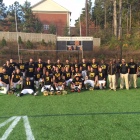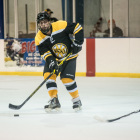“It’s just a great game for anybody to play really,” said Trevor Flesch. “I’ve had wrestlers, lacrosse players, football players, baseball players all come in, they all play it, and they all love it.”
Flesch, a junior at Kennesaw State University, is captain of the club speedball team. Never heard of it? According to Flesch, and multiple online sources, the game was created in the early 1920s at the University of Michigan.
Speedball is a game that combines football, soccer, and basketball. Lacrosse-style substitutions are thrown into the mix, but, for gameplay, it is mostly left to the former three.
“We try to get 12 people per side for the game,” said Flesch. “There’s actually three different positions: a runner, a deflector, and a receiver. They’re pretty self-explanatory.”
A runner is both an offensive and defensive position. They try to set-up scores by moving the ball toward the goal they are scoring in and keep it away from the one they are defending. A deflector is a defensive person who tries to defend the end zone and knock down the balls that are in the air for points. A receiver, for the most part, stays near the goal trying to catch the ball for a score.
Goals can be scored in different ways and are given either two points or three.
“For two points, all you have to do is throw it in,” said Flesch. “For three points, you can kick it in. That’s where the creativity starts. You can use any other parts of your body, other than your hands, to score (three) points.”
Any point scored has to be caught with the hands in the end zone. Even though you can use your feet, there is no goal or spot to kick the ball to that results in a score, unless you kick it in the air. Keep up.
Players cannot pick the ball up off the turf, nor can they catch it after it bounces off the turf. Any ground ball has to be played with the feet, into the air, and then caught. While a player has the ball in their hands, if another player touches them with both hands, it is a called a “handball” and is a turnover on the spot.
“It was a little hard to adjust because I play soccer normally,” said team member Kevin Kirkpatrick. “It was difficult to get used to catching the ball.”
Flesch said that he created the team because it was a sport that he played in high school and instantly fell in love with. He even wondered why it is not an Olympic sport because of the combination of athletic talents involved.
“It’s very fast paced,” said Flesch. “It uses the athlete’s entire body to move the ball between end zones. They have to be able to use their hands, their arms, their legs, and be able to make good decisions. That aspect of it was just thrilling for me to watch and to play.”
“I enjoy the pace of the game,” said Joey Sabbagh, a first year member of the team. “It’s a nonstop sport that can be played by anyone because no matter what size or strength you are, there’s at least one position you could be good at.”
For now, only KSU and Georgia Tech have speedball teams, but others are looking to join. Georgia College and State University, Georgia Gwinnett College, and the University of Georgia are all looking to add teams soon. GCSU and GGC are expected to begin play in 2014.
“It’s very exciting to know that other schools are branching out to have this sport,” said Sabbagh. “It’s a great game and fun, to me, because I can play more than one sport at a time. Once more schools get it, the competition gets better.
KSU and Georgia Tech have met on the field twice so far this year. The first resulted in a 26-26 tie between the squads in a preseason game. The second was a 41-20 victory for the Owls.
If the so few schools have teams and the sport has not been played in an organized fashion, how do the teams know what rules everybody will follow? Flesch fixed that problem by writing the rule book himself.
“There wasn’t one,” said Flesch. “The game was invented in the twenties, but it was a vastly different version from what we’re using today. We would play it in high school and there would be injuries that would happen, there would be arguments, and almost fist fights that happened because nobody knew what the rules were. They would always be argued about. I basically just said to myself, ‘Well, if this thing had a rule book, it could have potential,’ so that’s what I did freshman year.
“Right now, the rule book that I’ve written is being used by four universities as their guide and also the bylaws and officiating handbook that I’ve written are also being used,” said Flesch.



